VIPsight - October 2010
COMPANIES
Raid on price manipulators
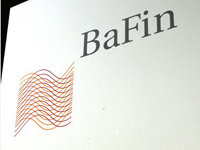 For two years now, extensive investigations by the police and the Federal Institution for Financial Services Oversight (BaFin) have been running against former deputy chair of investor association Schutzgemeinschaft der Kapitalanleger (SdK) Markus Straub, ex-SdK official Tobias Bosler and another 29 suspects. The accusations are price manipulation and insider trading, particularly in shares in the TECDAX company Wirecard, but also in “penny stocks” and possibly in the also TECDAX-listed Conergy. On 21 September police, public prosecutors and BaFin officials searched 48 offices and flats in Munich, Hamburg, Berlin and Kitzbühel, including the premises of the SdK, the Munich VEM Bank, Internet investor service Gonopa and financial publication “Der Aktionär”. Three suspects have been detained for investigation. Straub had already resigned from his post with the shareholder association in 2008, after he had been accused of manipulating the Wirecard share price downward in his position as shareholder lookout through his warnings, and himself speculating on falling prices. The accused, including journalists and writers of stock-exchange newsletters, allegedly drove the price downward using critical articles in the media and at annual general meetings, or upwards with recommendations, gaining millions in the process. At Wirecard the accusations even extend to money laundering, though the details are yet to be clarified. According to Der Spiegel, the investigators’ action is largely thanks to the “important preliminary work” by Wirecard’s lawyers, who do not wish the accusations to rest on them.
For two years now, extensive investigations by the police and the Federal Institution for Financial Services Oversight (BaFin) have been running against former deputy chair of investor association Schutzgemeinschaft der Kapitalanleger (SdK) Markus Straub, ex-SdK official Tobias Bosler and another 29 suspects. The accusations are price manipulation and insider trading, particularly in shares in the TECDAX company Wirecard, but also in “penny stocks” and possibly in the also TECDAX-listed Conergy. On 21 September police, public prosecutors and BaFin officials searched 48 offices and flats in Munich, Hamburg, Berlin and Kitzbühel, including the premises of the SdK, the Munich VEM Bank, Internet investor service Gonopa and financial publication “Der Aktionär”. Three suspects have been detained for investigation. Straub had already resigned from his post with the shareholder association in 2008, after he had been accused of manipulating the Wirecard share price downward in his position as shareholder lookout through his warnings, and himself speculating on falling prices. The accused, including journalists and writers of stock-exchange newsletters, allegedly drove the price downward using critical articles in the media and at annual general meetings, or upwards with recommendations, gaining millions in the process. At Wirecard the accusations even extend to money laundering, though the details are yet to be clarified. According to Der Spiegel, the investigators’ action is largely thanks to the “important preliminary work” by Wirecard’s lawyers, who do not wish the accusations to rest on them.
The SdK, whose Munich office was also searched, stated officially that the accusations have to do with long-known cases from between 2006 and 2008, and that the investigations were directed exclusively against the two ex SdK officials Straub and Bosler. According to the news magazine “Der Spiegel”, along with ex employee Christoph Öfele, SdK’s current chair Klaus Schneider is also among the accused. The association is one third financed through a share portfolio. However, the association holds the bulk of its securities, according to its own statements, in order to be able to challenge AGM decisions, said SdK spokesman Lars Labryga.
Commerzbank leaves payback open
 Commerzbank CEO Martin Blessing is still not saying when the second-largest German credit institution will be repaying the silent contribution by the government amounting to €16.4 billion. According to official interpretations, the bank is expected to begin the payback by 2012 at latest. Blessing has however clearly sketched out the procedure: first the silent contribution and then the government’s direct involvement of 25% plus one share are to be repaid. Doing away with the direct participation was not in the Commerzbank’s hands. According to the new Basel III capital rules, state aid will not be recognized as core capital until after 2017, so that there was no time pressure here. All the same, the bank was aiming at a rapid solution.
Commerzbank CEO Martin Blessing is still not saying when the second-largest German credit institution will be repaying the silent contribution by the government amounting to €16.4 billion. According to official interpretations, the bank is expected to begin the payback by 2012 at latest. Blessing has however clearly sketched out the procedure: first the silent contribution and then the government’s direct involvement of 25% plus one share are to be repaid. Doing away with the direct participation was not in the Commerzbank’s hands. According to the new Basel III capital rules, state aid will not be recognized as core capital until after 2017, so that there was no time pressure here. All the same, the bank was aiming at a rapid solution.
Conti to stay independent for some time
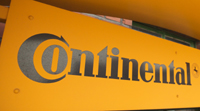 The operative business of automotive supplier Schaeffler and its holding in Hanover automotive supplier Continental have been put into a limited-liability company (GmbH). Additionally, employee representatives will for the first time be able to engage in co-determination on the Supervisory Board of the Bavarian group. It still remains open when the merger of Schaeffler with DAX-listed tiremaker Continental will come about. In an interview with Financial Times Deutschland, Schaeffler managing director Jürgen Geißinger said that at the moment there was no merger project between the two groups. A merger at the end of 2011 was, however, conceivable. “Both companies must first do their operational homework separately,” said Geißinger. After the capital increase at Continental in January, Schaeffler holds 42% of the Conti shares, while a further 33% are parked with banks.
The operative business of automotive supplier Schaeffler and its holding in Hanover automotive supplier Continental have been put into a limited-liability company (GmbH). Additionally, employee representatives will for the first time be able to engage in co-determination on the Supervisory Board of the Bavarian group. It still remains open when the merger of Schaeffler with DAX-listed tiremaker Continental will come about. In an interview with Financial Times Deutschland, Schaeffler managing director Jürgen Geißinger said that at the moment there was no merger project between the two groups. A merger at the end of 2011 was, however, conceivable. “Both companies must first do their operational homework separately,” said Geißinger. After the capital increase at Continental in January, Schaeffler holds 42% of the Conti shares, while a further 33% are parked with banks.
Deutsche Bank wants to fully consolidate Postbank
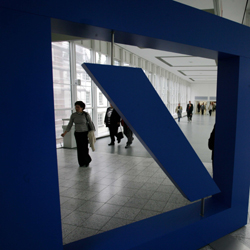 Currently, the Deutsche Bank holds 29.95% of the shares in Postbank. 40% are with Deutsche Post and a further 30% are on market as a free float. According to an agreement with Deutsche Post, the Frankfurt bank was to take over the remaining Post shares in 2013 at an average price of €35 per share. Josef Ackermann, CEO of Deutsche Bank, has now announced that his institution wants to fully consolidate Postbank by the year’s end, thus raising its share to over 50%. To achieve this, Ackermann offered Postbank shareholders in mid-September €25 per share with an option right in the ratio of two old shares to one new one – well below the price Deutsche Bank will have to pay Post for its remaining shares. To finance the public offering, the Deutsche Bank’s CEO has set going a parallel capital increase by 49.7% of the current registered capital. At a price of €33 per new share, the bank will thus take in by 6 October the record figure of 10.2 billion euros. The proceeds of the issue are also to go to strengthen the core capital. If it consolidates Postbank by the year’s end, Deutsche Bank will have to write down the Postbank shares by some €2.3 billion. To avert merger checks by US authorities, Deutsche Bank might sell part of the Postbank shares acquired to a third party, with a later buyback right.
Currently, the Deutsche Bank holds 29.95% of the shares in Postbank. 40% are with Deutsche Post and a further 30% are on market as a free float. According to an agreement with Deutsche Post, the Frankfurt bank was to take over the remaining Post shares in 2013 at an average price of €35 per share. Josef Ackermann, CEO of Deutsche Bank, has now announced that his institution wants to fully consolidate Postbank by the year’s end, thus raising its share to over 50%. To achieve this, Ackermann offered Postbank shareholders in mid-September €25 per share with an option right in the ratio of two old shares to one new one – well below the price Deutsche Bank will have to pay Post for its remaining shares. To finance the public offering, the Deutsche Bank’s CEO has set going a parallel capital increase by 49.7% of the current registered capital. At a price of €33 per new share, the bank will thus take in by 6 October the record figure of 10.2 billion euros. The proceeds of the issue are also to go to strengthen the core capital. If it consolidates Postbank by the year’s end, Deutsche Bank will have to write down the Postbank shares by some €2.3 billion. To avert merger checks by US authorities, Deutsche Bank might sell part of the Postbank shares acquired to a third party, with a later buyback right.
Hochtief faces hostile takeover
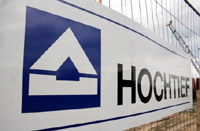 In mid-September, Spanish construction firm ACS unexpectedly announced a takeover bid to shareholders of German firm Hochtief. By the year’s end, ACS plans to raise its Hochtief holding to over 30%, and then build up further to over 50%. For five shares, the Spaniards are offering Hochtief shareholders eight ACS shares. Officially, the bid, which Hochtief regards as hostile, is to come in November. Only then could the Hochtief management officially take a position on it, said the Essen group’s CEO Herbert Lütkestratkötter. The group would defend itself against the takeover by every means, its CEO has already indicated. ACS currently holds 30% of the Hochtief securities and has two Supervisory Board posts. To protect the two ACS representatives against conflicts of interest, Hochtief has appointed an ad-hoc committee to discuss further proceedings, to which the ACS Supervisory Board members will not belong. Additionally, the Hochtief consulting team has taken on experts from Goldman Sachs. If there is a change of control at Hochtief, loans are likely to fall due.
In mid-September, Spanish construction firm ACS unexpectedly announced a takeover bid to shareholders of German firm Hochtief. By the year’s end, ACS plans to raise its Hochtief holding to over 30%, and then build up further to over 50%. For five shares, the Spaniards are offering Hochtief shareholders eight ACS shares. Officially, the bid, which Hochtief regards as hostile, is to come in November. Only then could the Hochtief management officially take a position on it, said the Essen group’s CEO Herbert Lütkestratkötter. The group would defend itself against the takeover by every means, its CEO has already indicated. ACS currently holds 30% of the Hochtief securities and has two Supervisory Board posts. To protect the two ACS representatives against conflicts of interest, Hochtief has appointed an ad-hoc committee to discuss further proceedings, to which the ACS Supervisory Board members will not belong. Additionally, the Hochtief consulting team has taken on experts from Goldman Sachs. If there is a change of control at Hochtief, loans are likely to fall due.
Infineon sells mobile-phone chip division
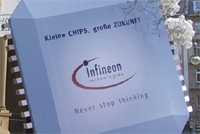 “Size without profit is useless,” says Peter Bauer, head of chipmaker Infineon, against critics of the sale of the mobile-phone chip division to US competitor Intel. For 1.4 billion US dollars in cash, the Americans are to buy the wireless solutions business (WLS) by the end of March 2011, and continue to run it as an independent business unit. The division became the biggest turnover producer at the German chip specialist in the current quarter. With the sale, the three business sectors of car electronics, industrial electronics and chip-card technology stay with the group; they will be strengthened by the sale, says Bauer. It is initially unclear whether Infineon will let its shareholders share in the WLS proceeds through a dividend. A special distribution or a share buyback have been ruled out by Bauer. The balance-sheet figures for the business year ending on 30 September are to be presented on 16 November.
“Size without profit is useless,” says Peter Bauer, head of chipmaker Infineon, against critics of the sale of the mobile-phone chip division to US competitor Intel. For 1.4 billion US dollars in cash, the Americans are to buy the wireless solutions business (WLS) by the end of March 2011, and continue to run it as an independent business unit. The division became the biggest turnover producer at the German chip specialist in the current quarter. With the sale, the three business sectors of car electronics, industrial electronics and chip-card technology stay with the group; they will be strengthened by the sale, says Bauer. It is initially unclear whether Infineon will let its shareholders share in the WLS proceeds through a dividend. A special distribution or a share buyback have been ruled out by Bauer. The balance-sheet figures for the business year ending on 30 September are to be presented on 16 November.
Siemens favours shareholders
 Public prosecutors in Vienna began investigations in September against two former Siemens employees suspected of bribery payments. Through camouflage firms, they are alleged to have paid business partners in Romania, Bulgaria and Bosnia and Herzegovina for alleged consulting and lobby services, without the corresponding services actually having been provided. Austrian newspaper “Der Standard” cites a figure of €600,000. Allegedly the two managers regularly went to head office in Munich and took the money from there to South-East Europe.
Public prosecutors in Vienna began investigations in September against two former Siemens employees suspected of bribery payments. Through camouflage firms, they are alleged to have paid business partners in Romania, Bulgaria and Bosnia and Herzegovina for alleged consulting and lobby services, without the corresponding services actually having been provided. Austrian newspaper “Der Standard” cites a figure of €600,000. Allegedly the two managers regularly went to head office in Munich and took the money from there to South-East Europe.
The conglomerate’s balance sheet is also coming under fire. In mid September it became known that Siemens will still have to be recording write-offs amounting to €1.4 billion in its diagnostics division in the fourth quarter of the business year ending in 30 September. These would not however affect payments, said the group. The division came into existence through the purchases of the firms DPC, Bayer Diagnostics and Dade Behring in 2006 and 2007. Altogether, Siemens laid 11 billion euros on the table for the purchases.
Siemens also announced that it would in future be distributing to shareholders a fixed proportion of its profits in a form of a dividend. The exact figure will be announced in November. The share buyback programme started in November 2007 had been stopped during the crisis. Additionally, the employment pact for the 128,000 employees in Germany, expiring in September, was extended until 2013.
ThyssenKrupp clears the decks
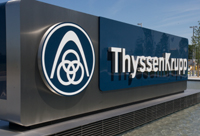 Materials and technology group ThyssenKrupp will from now on be doing no more new business with Iran, thus following the sanctions policy of the Federal Republic of Germany, the EU and the US, stated Thyssen CEO Ekkehard Schulz in mid September. The group is thus going beyond the sanction measures in the petroleum sector. Existing involvements in Iran will according to the board decision be terminated as soon as possible.
Materials and technology group ThyssenKrupp will from now on be doing no more new business with Iran, thus following the sanctions policy of the Federal Republic of Germany, the EU and the US, stated Thyssen CEO Ekkehard Schulz in mid September. The group is thus going beyond the sanction measures in the petroleum sector. Existing involvements in Iran will according to the board decision be terminated as soon as possible.
The steel group has also managed to find a solution for its participation in Greek dockyards Hellenic Shipyards (HSY), thus withdrawing further out of the lossmaking shipyard business. ThyssenKrupp Marine Systems, Abu Dhabi Mar (ADM) and the Greek government were able after months of negotiations to agree that Thyssen can sell a 75.1% share to Arab investors. With the remaining 24.9%, Thyssen will continue to be involved in HSY. With the latest deal, it was long controversial whether the Greek government would pay the shipyard €2.85 billion for four submarines ordered in 2000 or not. 80% of the value of the contract had been paid in advance. In early September the EU Commission also approved the merger of ThyssenKrupp’s shipbuilding business with Abu Dhabi Mar. ADM will accordingly takeover the civil shipbuilding division of the Blohm & Voss yard and the civil sections of Howaldtswerke-Deutsche Werft.
TUI becomes a tourism group
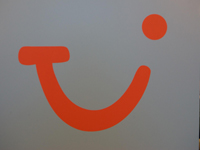 The tourism and shipping group TUI will in the foreseeable future get rid of its 43% holding in shipping company Hapag-Lloyd, thus becoming a pure tourism provider. After the immense downturn by the Hamburg shipping firm, in 2008 TUI sold the bulk of the Hapag-Lloyd shares to the Albert-Ballin-Konsortium. Now the shipping company is sailing in profitable waters again, so that the Hamburg company’s Supervisory Board was able to set comprehensive refinancing going. In course of this the shipping company will place a company loan and secure a syndicated credit. As a condition of this, Hapag-Lloyd will pay back the €1.2 billion state guarantee, enabling the Hamburgers to resume interest payments for a company loan to TUI and pay back a bridging loan of €227 million. In October, the Hanover group will take in €65 million in delayed interest claims. A further loan of €350 million is being converted to equity by 2010, so that TUI will then hold 49.8% of the Hapag-Lloyd share. This comprehensive refinancing is the condition for the tourism group to be able to sell its shares in Hapag-Lloyd. The Ballin-Konsortium has a pre-emption right on the shares held by TUI. The proceeds from selling the shipping-company shares are to be used for the complete takeover of the British subsidiary TUI Travel, in which TUI currently holds 57% of the shares. Along with Russian steel millionaire Alexei Mordashov, who indicated he was expanding his holding in the Hanover company to 25-30%, TUI CEO Michael Frenzel will in future be expanding internationally.
The tourism and shipping group TUI will in the foreseeable future get rid of its 43% holding in shipping company Hapag-Lloyd, thus becoming a pure tourism provider. After the immense downturn by the Hamburg shipping firm, in 2008 TUI sold the bulk of the Hapag-Lloyd shares to the Albert-Ballin-Konsortium. Now the shipping company is sailing in profitable waters again, so that the Hamburg company’s Supervisory Board was able to set comprehensive refinancing going. In course of this the shipping company will place a company loan and secure a syndicated credit. As a condition of this, Hapag-Lloyd will pay back the €1.2 billion state guarantee, enabling the Hamburgers to resume interest payments for a company loan to TUI and pay back a bridging loan of €227 million. In October, the Hanover group will take in €65 million in delayed interest claims. A further loan of €350 million is being converted to equity by 2010, so that TUI will then hold 49.8% of the Hapag-Lloyd share. This comprehensive refinancing is the condition for the tourism group to be able to sell its shares in Hapag-Lloyd. The Ballin-Konsortium has a pre-emption right on the shares held by TUI. The proceeds from selling the shipping-company shares are to be used for the complete takeover of the British subsidiary TUI Travel, in which TUI currently holds 57% of the shares. Along with Russian steel millionaire Alexei Mordashov, who indicated he was expanding his holding in the Hanover company to 25-30%, TUI CEO Michael Frenzel will in future be expanding internationally.
Piëch settles inheritance
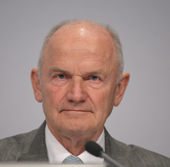 “I have the secured future of our companies at heart,” dictated automobile patriarch Ferdinand Piëch in September to the notebooks of journalists from the weekly Focus. It is the Porsche grandson’s declared aim to raise Volkswagen by 2018, following the announced merger with Porsche, to number one in the world, above Toyota. But in order to prevent his inheritance in the billions from being broken up amongst his twelve children, he has placed his share of just over 7% of Porsche and the 10% he holds in Europe’s biggest car trader, Porsche Holding in Salzburg, in two Austrian foundations. According to their charters, shares may be sold only if at least nine heirs, the board and the foundations’ advisory council all agree. While some of his children are considering legal steps against the foundations’ model, the VW Supervisory Board chair and Porsche Supervisory Board member is sure that he will be able to take VW to the top only if there are stable ownership relations.
“I have the secured future of our companies at heart,” dictated automobile patriarch Ferdinand Piëch in September to the notebooks of journalists from the weekly Focus. It is the Porsche grandson’s declared aim to raise Volkswagen by 2018, following the announced merger with Porsche, to number one in the world, above Toyota. But in order to prevent his inheritance in the billions from being broken up amongst his twelve children, he has placed his share of just over 7% of Porsche and the 10% he holds in Europe’s biggest car trader, Porsche Holding in Salzburg, in two Austrian foundations. According to their charters, shares may be sold only if at least nine heirs, the board and the foundations’ advisory council all agree. While some of his children are considering legal steps against the foundations’ model, the VW Supervisory Board chair and Porsche Supervisory Board member is sure that he will be able to take VW to the top only if there are stable ownership relations.
To bring his vision of a full-range car group with a product portfolio ranging from small cars up to 40-tonners closer, the utility-vehicle business is also to be expanded. Even before the formal foundation of a lorry division in October, VW has appointed top-grade managers to bring forward cooperation between the two utility-vehicle holdings in MAN (VW share some 30%) and Scania (70%). The first thing to aim at in this joint development is to be rear axles and gearboxes. MAN CEO Georg Pachta-Reyhofen does not, despite the closer connections, expect VW to expand its holdings in the Munich utility-vehicle maker.
Raid on British Daimler offices
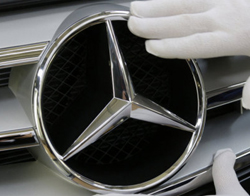 The British antitrust authority, the Office of Fair Trade (OFT), has searched Daimler offices near Milton Keynes northwest of London. The British competition watchdogs suspect the world’s biggest utility-vehicle maker and several leading lorrymakers (MAN, Renault, Scania and Volvo) of illegal price agreements on the British market for utility vehicles. One person had been arrested and released on bail, said a spokesman for the British authority. Daimler in Stuttgart stated it was cooperating closely with the OFT. The Italian Fiat group, to which lorrymaker Iveco belongs, will also be cooperating with the regulator. According to a report in the newspaper “La Repubblica” for 22 September, the Swabians allegedly want to buy the Italians’ whole industrial division, but at least the lorry brand Iveco it owns. While both sides are attempting to minimize matters, the German carmaker allegedly already held talks in summer with Fiat and offered nine billion Euros. Fiat had however asked for 10.5 billion.
The British antitrust authority, the Office of Fair Trade (OFT), has searched Daimler offices near Milton Keynes northwest of London. The British competition watchdogs suspect the world’s biggest utility-vehicle maker and several leading lorrymakers (MAN, Renault, Scania and Volvo) of illegal price agreements on the British market for utility vehicles. One person had been arrested and released on bail, said a spokesman for the British authority. Daimler in Stuttgart stated it was cooperating closely with the OFT. The Italian Fiat group, to which lorrymaker Iveco belongs, will also be cooperating with the regulator. According to a report in the newspaper “La Repubblica” for 22 September, the Swabians allegedly want to buy the Italians’ whole industrial division, but at least the lorry brand Iveco it owns. While both sides are attempting to minimize matters, the German carmaker allegedly already held talks in summer with Fiat and offered nine billion Euros. Fiat had however asked for 10.5 billion.
Accusations against Obermann
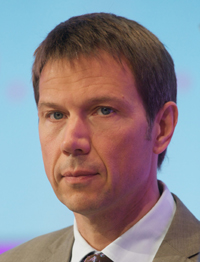 Bonn public prosecutors have commenced investigations against René Obermann on accusations of bribery in Macedonia and Montenegro. According to the brief, officials accused Deutsche Telekom managers of having negotiated a sort of secret agreement with the Macedonian government. For instance, non-issue of a third mobile-telephony licence is said to have been associated in a secret agreement with dividend payments in the millions to the Macedonian government. Obermann is said to have been kept up to date on the state of the negotiations with the Macedonian government in e-mails, and proof of this is allegedly in the possession of the investigators. The CEO of the Bonn telephone company rejects the criminal accusations against it as false, as Telekom went on to state. The occasion for the large-scale searches two weeks ago was a request from America for judicial assistance, said Bonn public prosecutor Friedrich Apostel. Irrespective of the investigations, the Telekom Supervisory Board wishes to renew Obermann’s board contract.
Bonn public prosecutors have commenced investigations against René Obermann on accusations of bribery in Macedonia and Montenegro. According to the brief, officials accused Deutsche Telekom managers of having negotiated a sort of secret agreement with the Macedonian government. For instance, non-issue of a third mobile-telephony licence is said to have been associated in a secret agreement with dividend payments in the millions to the Macedonian government. Obermann is said to have been kept up to date on the state of the negotiations with the Macedonian government in e-mails, and proof of this is allegedly in the possession of the investigators. The CEO of the Bonn telephone company rejects the criminal accusations against it as false, as Telekom went on to state. The occasion for the large-scale searches two weeks ago was a request from America for judicial assistance, said Bonn public prosecutor Friedrich Apostel. Irrespective of the investigations, the Telekom Supervisory Board wishes to renew Obermann’s board contract.















